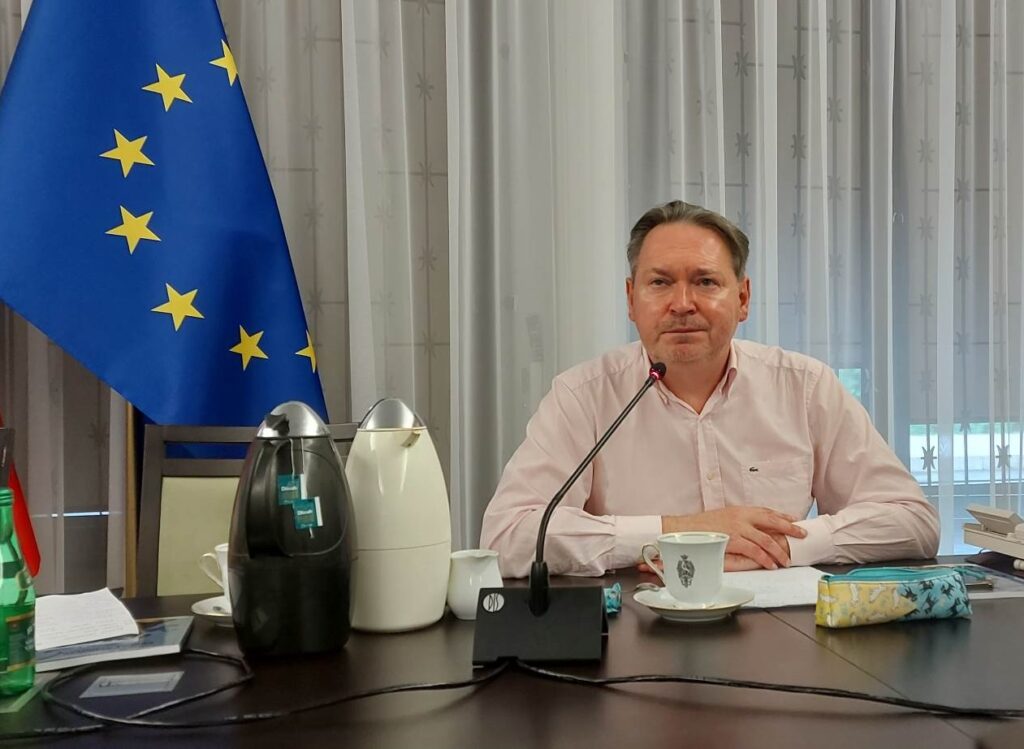
“What we are dealing with today is a departure from these assumptions both in the sphere of values and in the systemic sphere when it comes to Robert Schuman’s political thought. So the worst scenario that he warned against is coming true in front of us – through various kinds of centralization activities, we are building a super-state” – prof. Tomasz Grzegorz Grosse, political scientist, lecturer at the University of Warsaw, said during the session of “Schuman’s Group” in Senate referring to the contemporary European Union. The topic of the meeting, which took place on June 21, 2023, was to recall Robert Schuman’s vision of the European Community.
“Schuman, as a Christian Democrat, as one of the Founding Fathers of the European Community, is primarily known for being faithful to the tradition of European values understood as a legacy of Christian values. He believed that a certain departure or loss of these values was one of the causes of the cataclysm of World War I and II” – said Prof. Tomasz Grzegorz Grosse, noting that today’s supranational elites in the European Union believe that nations and nation states are the problem. At the same time, he reminded that the basis of social life in Schuman’s concept is Christianity and the political order based on it in the spirit of solidarity and openness to others. “Today, Christianity is rather uprooted, pushed to the margins, and European values are located in a completely different area when it comes to political beliefs” – prof. Grosse noted.
“Schuman, in his Christian Democratic approach, was at the same time tolerant. He did not prohibit anyone from expressing other values, admitting to a different political axiology, but at the same time he was fully committed to his values, as he believed that they were the most important and believed that there is a foundation on which Europe must be built. Of course, he was in favor of a Europe of homelands, i.e. he did not agree to the eradication of national affiliation, to any attempts of weakening nations, national traditions, national cultures by marginalizing or pushing constitutional orders into oblivion, by revolutionary changes social, including demographic ones” – noted the political scientist, adding that “he believed that a healthy Europe should develop based on the concept of a Europe of homelands”.
The policy of systemic pauperization of the population in Europe
“What we are dealing with today is a departure from these assumptions both in the sphere of values and in the systemic sphere when it comes to Robert Schuman’s political thought. So the worst scenario that he warned against is coming true in front of us – through various kinds of centralizing activities we are building a super-state. A super-state that diminishes in importance, limits the space that Europe previously left to member states, national democracies. This also has certain consequences for the quality of democracy, because this super-state will not be and is not democratic. It is ruled by a relatively small elite of technocrats, judges, with very large influences from the ‘backseat’ of basically the two largest countries and, to a greater or lesser extent, their allies, or sometimes even satellites. This is Europe, which not only becomes less democratic – this is the first, most important consequence superstate – but it is also increasingly based on coercion. Coercion concerns the values that are adopted by Brussels. Coercion is about political correctness, what you can say, what you can’t say. Coercion applies to many other matters that have never been the competence of the European Union before and, even in the light of the treaties, still are not, but these competences have been informally taken over by Brussels” – he diagnosed the situation.
As an example, the political scientist gave the climate policy of the European Union. “It is popularly called a policy that is supposed to protect the climate. Of course, this is a misnomer for a very simple reason: the EU, no matter how much it doubles and triples, has no influence on climate change. And this is a fact that probably no one can deny. If we have 8% of global emissions, we do not reverse the trend, even when we go down to zero. This is a wrong name. However, this policy should be called ‘a policy of systemic pauperization of the population in Europe’, because that will be the result” – he emphasized. “This is what this policy should be called. Is it in line with Schuman’s ideas? I doubt it very much. However, it is in line with various interests of industrial lobbies, including non-European ones, and finally with certain ideological tendencies that, as they say, throw the baby out with the bathwater” – he added, pointing out that examples could be multiplied.
“The answer to our problems is not a superstate that limits national production, the competences of Member States, at least some, in fact the majority in Europe. It cannot be based on coercion, because it destroys solidarity and friendship between nations, which were an extremely important value for Schuman” – prof. Grosse said.
“Europe of homelands is a decentralized Europe, it is a subsidiary Europe, i.e. helping member states in crisis, but not replacing national authorities, citizens or voters with some ‘enlightened’ elite that imposes the best solutions by force. We have gone through so many social engineering experiments in Europe where a group of ‘enlightened’ leaders imposed certain solutions that usually ended tragically, and even in the European Union many crises, instead of being effectively resolved, actually generate new crises” – he noted.
The expert pointed out that the best example is the migration crisis, which cannot be resolved in any way, because feigned actions are taken that have no meaning from the point of view of the causes of the crisis.
Anna Wiejak
